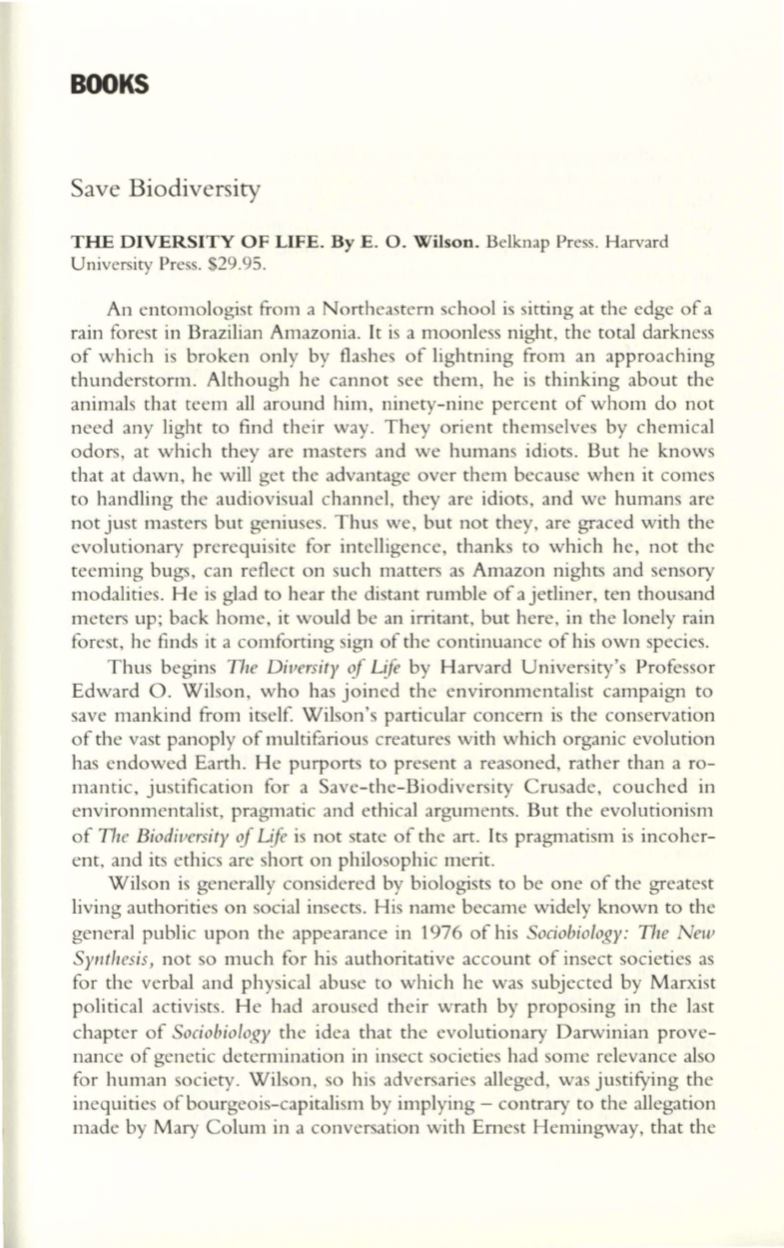
BOOKS
Save Biodiversity
THE DIVERSITY OF LIFE. By
E.
o.
Wilson.
Belknap Press. Harvard
University Press. $29.95.
An entomologist from a Northeastern school is sitting at the edge of a
rain forest in Brazilian Amazonia. It is a moonless night, the total darkness
of which is broken only by flashes of lightning from an approaching
thunderstorm. Although he cannot see them, he is thinking about the
animals that teem all around him, ninety-nine percent of whom do not
need any light to find their way. They orient themselves by chemical
odors, at which they are masters and we humans idiots. But he knows
that at dawn, he will get the advantage over them because when it comes
to handling the audiovisual channel, they are idiots, and we humans are
not just masters but geniuses. Thus we, but not they, are graced with the
evolutionary prerequisite for intelligence, thanks
to
which he, not the
teeming bugs, can reflect on such matters as Amazon nights and sensory
modalities. He is glad to hear the distant rumble of a jetliner, ten thousand
meters up; back home, it would be an irritant, but here, in the lonely rain
forest, he finds it a comforting sign of the continuance of his own species.
Thus begins
The Diversity oj Life
by Harvard University's Professor
Edward O . Wilson, who has joined the environmentalist campaign
to
save mankind from itself Wilson's particular concern is the conservation
of the vast panoply of multifarious creatures with which organic evolution
has endowed Earth. He purports to present a reasoned, rather than a ro–
mantic, justification for a Save-the-Biodiversity Crusade, couched in
environmentalist, pragmatic and ethical arguments . But the evolutionism
of
The Biodiversity oj Life
is not state of the art. Its pragmatism is incoher–
ent, and its ethics are short on philosophic merit.
Wilson is generally considered by biologists to be one of the greatest
living authorities on social insects. His name became widely known to the
general public upon the appearance in 1976 of his
Sociobiology: The New
Synthesis,
not so much for his authoritative account of insect societies as
for the verbal and physical abuse to which he was subjected by Marxist
political activists. He had aroused their wrath by proposing in the last
chapter of
Sociobiology
the idea that the evol utionary Darwinian prove–
nance of genetic determination in insect societies had some relevance also
for human society. Wilson, so his adversaries alleged, was justifYing the
inequities of bourgeois-capitalism by implying - contrary to the allegation
made by Mary Colum in a conversation with Ernest Hemingway, that the


